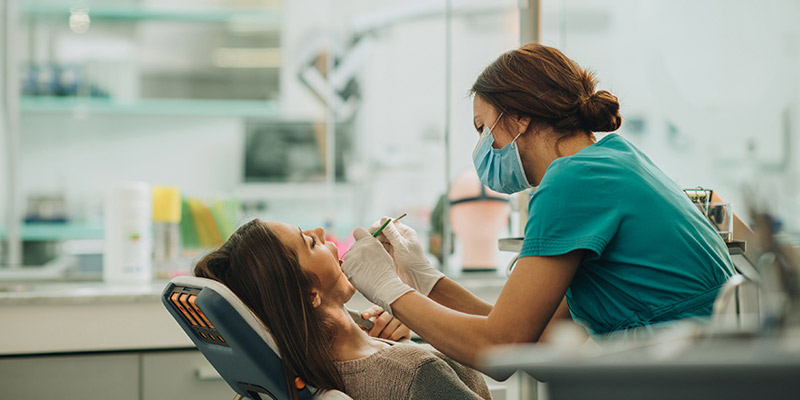Whether due to recurring infection or crowding of the teeth, many Australians will need their wisdom teeth out at some point, with most people having the procedure done in their late teens or twenties.

For some, this can be a minor procedure, with a straight-forward extraction of just one or two teeth. However, for those whose wisdom teeth are impacted or require three or four teeth removed, it can be a more invasive and unpleasant experience.
Like most dental procedures, wisdom tooth removal is not covered by Medicare, however there may still be options available to you under the public system. Here, we explain the key considerations and how the public and private systems differ when it comes to wisdom tooth extraction.
Eligibility for public dental support
Firstly, it’s important to know that not everyone is eligible for public dental services, and before making a decision to rely on the public system, it’s worth checking whether you qualify. Each state is different, in New South Wales for example, 47% of the population is eligible, however this state’s eligibility criteria is more generous than most.
Waiting lists
If seen privately, wisdom tooth removal can take place in a matter of days or weeks, however the wait can be far more substantial if relying on the public system. For example, government data shows that -- while not wisdom teeth specific -- at the end of June 2017, 13,555 children and 98,322 adults were on public dental waiting lists in New South Wales alone.
If you’re unable to wait due to extreme pain or infection, those without health insurance can still book in with a private specialist and be treated quickly, however you will have to pay the full cost, most likely upfront -- more on this below.
Costs
Straightforward wisdom tooth extractions can take place ‘in the chair’ at the dentist’s rooms, and can cost up to $400 per tooth approximately, with consultation and x-ray fees on top of this. The good news is that for those with extras health insurance, depending on your policy some or all of this expense will be covered.
For more complex or invasive procedures, your dentist may recommend that you see a specialist to have the extraction done in hospital under sedation or general anaesthetic. This may involve hospital, medical and dental costs.
The typical cost of a tooth extraction in a Members Choice Hospital was $1,580 last financial year, including medical and hospital costs. Depending on your policy, your health insurance may cover some or all of these expenses.
If you are getting your wisdom teeth out using your private health insurance, check with your dentist, doctors, hospital and health insurer to see what out-of-pocket expenses you may have to pay, including your excess.
Choice
With private health insurance, you’ll be able to choose your dentist or oral surgeon, and depending on your case, you may have an opportunity to have a say in how the extraction takes place -- whether ‘in the chair’ under local anaesthetic, or in hospital under sedation or general anaesthetic. This can be particularly worthwhile if you’re feeling nervous about the procedure. In contrast, those who get their wisdom teeth removed in the public system will not have a say in who they see or how the procedure is carried out.
Chief Medical Officer Linda Swan summarises: “For those who are eligible for public dental support and are weighing up their options, the major considerations are really around waiting times and choice. Unlike public, in the private system you’ll be able to be seen quickly, choose your own specialist, and you may even be able to have a say on where the procedure is carried out.”
“For those who are not eligible for public dental support and are weighing up their options, the major consideration will be around cost, with those who are not covered by health insurance at risk of being hundreds or even thousands of dollars out-of-pocket.”
Get 100% back on dental check-ups twice a year on eligible extras*
Aside from paying benefits for wisdom teeth removal, Medibank members with eligible extras cover can also get 100% back on up to two dental check-ups at a Members’ Choice Advantage dentist every calendar year, including x-rays (if clinically required).*
And remember, every health insurance policy is different. If having health insurance that helps pay towards getting your wisdom teeth out is important to you, check it’s included in your policy. Waiting periods apply.

Looking for something else?
Visit our Hospital Assist homepage for a range of tools and advice to help you at every stage of your hospital journey.
Help the way you want it
Contact us
Call us on 134 190 to speak to a consultant. Alternatively, chat to us 24/7 online.
Self-service options
Login to MyMedibank or Download the MyMedibank App for self service options.
Find a specialist
Find a specialist or Member's choice hospital using our find a provider tool.

Things you need to know
* Eligible members on Medibank extras (excluding Healthy Living Extras and Gold Ultra Health) can claim a maximum of two 100% back dental check-ups per member, per year at a Members’ Choice Advantage provider (including bitewing x-rays where clinically required). For members on eligible extras, the first two check-ups do not count towards your annual limit. Members with Healthy Living Extras can get 100% back on one dental check-up each year at a Members’ Choice Advantage provider (including up to two bitewing x-rays, where clinically required) or at a Members’ Choice provider (excluding x-rays). Members with Gold Ultra Health can get 100% back on up to three dental check-ups at a Members’ Choice or Members’ Choice Advantage provider. Members’ Choice and Members’ Choice Advantage providers are not available in all areas. Two month waiting period applies.Some products may have other dental benefits, check your cover summary for details.
While we hope you find this information helpful, please note that it is general in nature. It is not health advice, and is not tailored to meet your individual health needs. You should always consult a trusted health professional before making decisions about your health care. While we have prepared the information carefully, we can’t guarantee that it is accurate, complete or up-to-date. And while we may mention goods or services provided by others, we aren’t specifically endorsing them and can’t accept responsibility for them. For these reasons we are unable to accept responsibility for any loss that may be sustained from acting on this information (subject to applicable consumer guarantees).